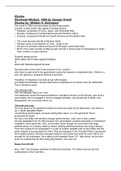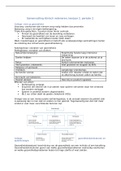Review
Reviewed Work(s): 1984 by George Orwell
Review by: William H. Rehnquist
The world in 1984 now dominated by only three powers
(London is still London, the capital of Airstrip Seven):
• Eastasia, composed of China, Japan, and Southeast Asia;
• Eurasia, composed of continental Europe and Northern Africa;
• Oceania, composed of North and South America and the British Isles
• The novel recounts the life of Winston Smith
• Winston works at the Ministry of Truth - deals in lies
• His job is to process orders coming to him through a pneumatic tube.
• Much of his work consists of altering past records or back issues of newspapers to make
them conform to party doctrine
Oceania always at war
either allied with Eurasia against Eastasia
or
allied with Eastasia against Eurasia
General public (more than three-quarters of are “proles”)
who have no part at all in the government cannot be trusted to understand why, if there is a
why, the alliances constantly shift back and forth.
Therefore, if Oceania is currently at war with Eurasia
and allied with Eastasia, all past references to Eastasia as an enemy must be obliterated.
This is Winston's work.
Two minutes hate:
The Two Minutes Hate is at 11am
The telescreen shows Emmanuel Goldstein, branded an Enemy of the People, was once a
party leader, but he engaged in but he engaged activities, was sentenced to death, and
disappeared (no one knows where to).
The book and Julia:
He in an alcove of his apartment where he cannot be seen by the telescreen, and writes in
his "I HATE BIG BROTHER."
Just thinking bad thoughts, let alone writing them down, is a "thoughtcrime" that is
punishable by death
He has a love affair with another younger party member, Julia, who is also a rebel.
He has separated from his wife because her conversation consists principally of mechanical
recitations of the party line. Julia, on the other hand, though not concerned with large
political issues, is a spunky rebel by nature, defying authority because she enjoys doing it.
They find a place for an assignation in a part of London peopled only by the proles. But the
party network is too pervasive for them; they are betrayed to the Thought Police, imprisoned,
and brutally tortured. Winston emerges broken in both body and spirit, but even this is not
enough for his custodians. He is taken to the dreaded Room 101, after which, as the book
ends, he realises that far from hating Big Brother, he loves him.
Notes from W.H.R
May, 1947, the Russians relented and lifted the blockade. The Allies had won the first
confrontation of the Cold War.
, Thus to a reader in England in 1949, the society portrayed in Orwell's book represented a
possibility - albeit a distant one - that could occur in Western Europe or the British Isles.
Whether by conquest or subversion, a totalitarian regime might be imposed sometime in the
future.
Orwell does not tell us how Big Brother's regime came to power in Oceania. There are
vague references in the text to the wars of the 1950's, and perhaps the change from a liberal
democracy to a totalitarian tyranny occurred as an aftermath of them
On another level, 1984 is worth reading as an allegory or fable. It teaches us that totalitarian
regimes need not rely extensively on gulags or other forms of imprisonment to stay in power.
Indeed, imprisonment may be a far less effective measure than those employed by Big
Brother. Most of the citizens of Oceania about whom Orwell writes are free to go about their
daily lives. But this freedom is no more than that given to a pet dog or cat by its master.
Spiritually and intellectually, they are prisoners of Big Brother
The threat of totalitarian rule is, from the point of view of Western Europe, much more
remote now than it was in 1949 when the book was published. But in other parts of the
world, it is not merely a threat but a reality. The book stands as a warning against letting
liberal democracy slip away or be extinguished where it already exists and as a testament to
the meager lives of those who presently live under such a regime.
GEORGE ORWELL AND THE THEORY OF TOTALITARIANISM: A
1984 RETROSPECTIVE Author(s): George M. Enteen





